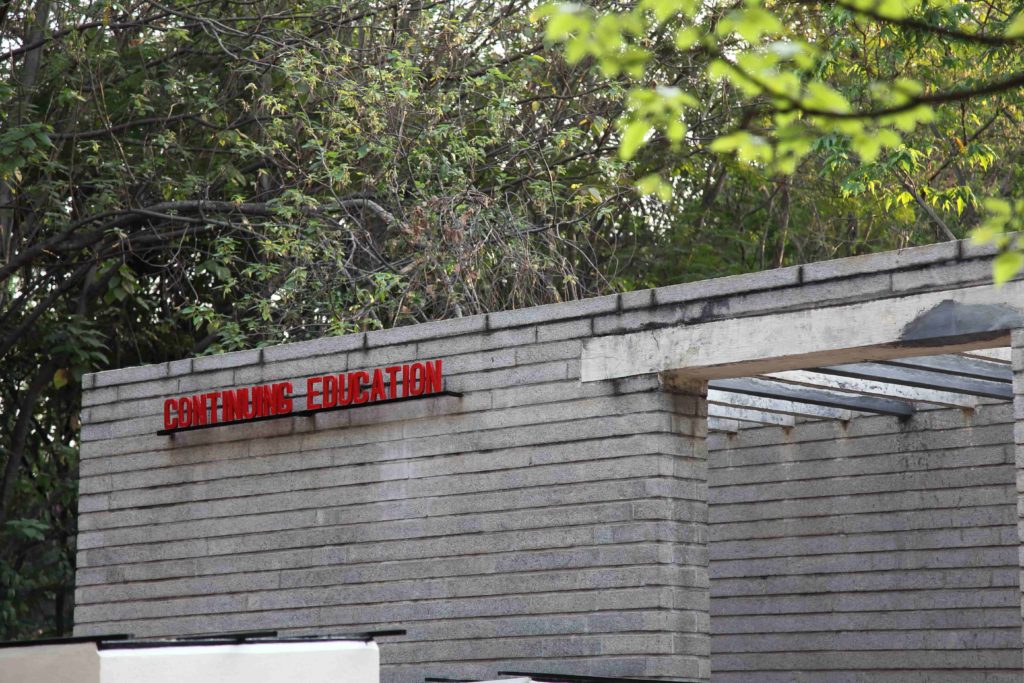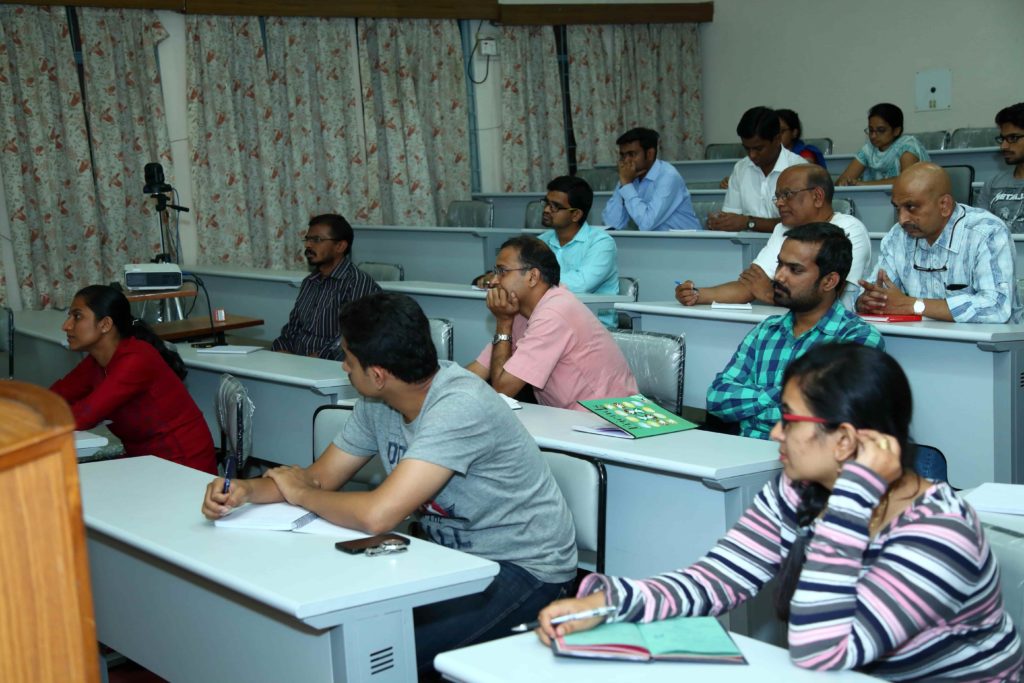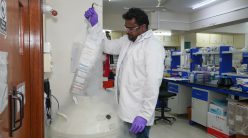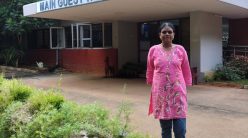The Centre for Continuing Education has something for everyone

The Centre for Continuing Education (CCE) grew out of an awareness that, for institutions like IISc, imparting knowledge to people beyond their boundaries is an important part of their service to the community. Continuing education, as a brochure from CCE’s early years states, is the idea that the education of professionals, because of the rapid strides in science and technology, should be “continued in short spans of time over their entire career rather than be confined to a single extensive stretch”, and that this can be achieved with “a complete integration of education with work during their productive lifespan”.
Aiming to meet the continuing education needs of R&D labs, industries and college teachers, CCE was set up in 1975. “We have different programmes for these different target groups, and each programme has a faculty member of the Institute as the coordinator,” says GL Sivakumar Babu (Professor, Department of Civil Engineering), Chair of CCE.
One of the oldest such programmes is the Quality Improvement Programme (QIP), begun in 1970 nationally, and in 1972-73 in IISc (later brought under the purview of CCE). It aims to “upgrade the expertise and capabilities” of teachers at engineering colleges that are accredited by the All India Council for Technical Education (AICTE), by enabling them to pursue MTech and PhD programmes at QIP centres. IISc is one of the nine major QIP centres, having awarded 227 PhD and 236 MTech degrees under this programme since 1980.
But there’s not much demand for MTech admissions through QIP now, says G Narayanan (Professor, Department of Electrical Engineering), the coordinator for QIP, because most teachers at engineering colleges these days already have an MTech. From the small number who apply, only one has been selected in each of the last three years. For the PhD programme too, the number of selections have come down in recent years because of a dearth of quality applicants, as well as the fact that many applicants choose to go to other, smaller, QIP centres which are perceived to have a less rigorous academic environment. Only four PhD applicants were admitted in each of the last two academic years under QIP, with 15 currently on roll.
The PhD students who enter through QIP stay on campus for three years, and are then expected to go back to their colleges and continue their research work. But this proves difficult for most people due to the teaching workload at their colleges, says Narayanan.
There are also week-long courses for college teachers organised under QIP, sponsored by AICTE. Around 20 such courses have been organised in each of the last two years, an increase from the handful that used to be conducted earlier. These courses benefit hundreds of teachers from engineering colleges. “Teachers are force-multipliers, because good teachers can then make a difference to hundreds of students they teach,” says Narayanan, who has taught QIP short-term courses. “If you’re able to connect with them, their response is good. Some of them have written very moving and touching comments in their feedback.”

Proficience is a unique programme that offers courses open to anyone with the prerequisites. These are semester-long courses on varied subjects – from French language courses to ones on deep learning – held for two or three hours a week during evening hours so that working professionals can attend after their office hours. These courses are at the postgraduate level – mostly taught by IISc faculty but some from outside IISc too – and are often courses that are offered to IISc students. Around 50 such courses were offered last year, benefiting working professionals who need to acquire new knowledge.
“It’s not just the papers from IISc that should go out,” says Narayanan of these courses. “The body of knowledge that is present with the faculty of the Institute should be available to society and should benefit the practitioners who could use such knowledge.”
The Proficience programme – whose coordinator is P Balachandra (Principal Research Scientist, Department of Management Studies) – was started in 1980, when it was practical for people to commute to attend evening classes after work. This is no longer the case for many who are interested to take these courses, so the courses are also offered online now.
Outside of Proficience and QIP, faculty members can also offer short-term courses, of varying duration. Upto 20 such courses are held each year, attended by around 500 participants. Courses are also conducted upon request from organisations such as BHEL, who send their employees for training.
Through such initiatives, students, college teachers and professionals who may not otherwise be able to attend courses at IISc “can come and experience for themselves the academic quality of IISc,” says Narayanan. This also effectively serves as an advertisement for IISc, potentially enlarging, by word- of-mouth, the pool of students who apply for the traditional academic programmes at the Institute.
CCE participates in two national-level educational programmes, the National Programme on Technology Enhanced Learning (NPTEL) and Global Initiative of Academic Networks (GIAN) – these are coordinated by L Umanand (Professor, Department of Electronic Systems Engineering) and AG Ramakrishnan (Professor, Department of Electrical Engineering), respectively. CCE issues certificates on behalf of NPTEL for the courses conducted at IISc through this programme. It also conducts GIAN courses at IISc, where eminent international experts are invited to teach week-long courses – one or more IISc faculty as course coordinators – on specialised subjects.
In addition to conducting courses as part of these various programmes, CCE is also involved in supplementing the traditional curriculum. It has a Curriculum Development Cell which was, until recently, funded by the AICTE. It was meant to encourage faculty members to produce learning materials such as books. The Cell, now funded by CCE, still provides such support to faculty members, and has produced educational kits. A larger effort to reach out to school and college students is the Extension Lecture Programme, which sees faculty from the Institute volunteer to give talks on topics of their choice at schools and colleges across Karnataka who send in requests to the CCE office. This initiative, begun in 1990, was discontinued in 2010 but was restarted in 2016. This year, about 200 requests for lectures have been received from schools and colleges, says M Nethaji (Chief Research Scientist, Department of Inorganic and Physical Chemistry), the coordinator of this programme. About 50 such lectures were held last year, although the number of faculty participating is still small.
In fact, for all these programmes to succeed and grow, greater participation from faculty of the Institute is necessary. “I’d like to encourage faculty members to come forward and participate in the various programmes of CCE,” says Sivakumar Babu.




